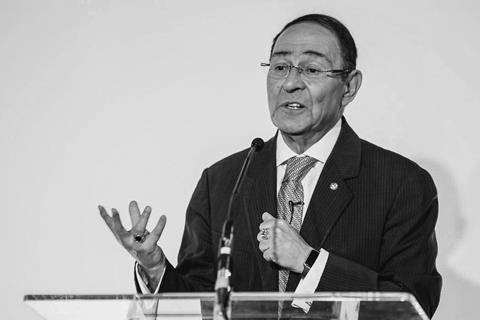David Rudlin celebrates Howard Bernstein’s strategic foresight and the transformative projects that underscore the enduring impact of his civic leadership

Not since Joseph Chamberlain in the 1870s has any individual changed a city so much as Sir Howard Bernstein changed Manchester. Howard’s death on 22 June, just eight years after his retirement, came as a great shock and there have been many tributes.
I cannot claim to have known him very well, although I met him on many occasions. Indeed, I suspect that he thought (wrongly) that I was not fully on board with his project for Manchester.
Sir Howard started work at Manchester council as a 17-year-old junior clerk. He came from the north Manchester Jewish community and was the grandson of Russian emigrants. He worked his entire career at the council, becoming chief executive in 1998.
They saved Manchester, turning it from a run-down city on the brink of collapse to one of the fastest-growing cities in Europe
For two decades he worked alongside council leader Sir Richard Leese, although anyone who didn’t know them could have been forgiven for thinking that Bernstein was the politician and soft-spoken Leese the civil servant. Together, they saved Manchester, turning it from a run-down city on the brink of collapse to one of the fastest-growing cities in Europe.
Our first meeting was when I was a junior planning officer in the late 1980s. That was at the start of the redevelopment of Hulme, which Howard regarded as his greatest achievement. As he told the BBC on his retirement, “erecting something like Beetham Tower is much easier. (Hulme) was transforming communities, people’s lives. Look at it now.”
>> Also read: Mayfield, Manchester: A park for the people
As a young planning officer, Hulme was my patch, and our first meeting included a warning that I was getting too close to the area’s famously combative tenants’ groups, who were at the time occupying the council’s local project office.
It was during the Hulme redevelopment that Howard’s plans for Manchester took shape. He developed a proposal to use the Hulme model to transform the design of the whole of Manchester. This was done through a panel of local architects and other built environment professionals, including myself, who developed the first Manchester Guide to Development.

Much of what the guide said is mainstream today, but at the time there were widespread objections from the planners, highways engineers, police, housing associations etc. Howard cut through all of this, removing officers where necessary and eventually bringing the planning department under his wing in the chief executive’s department.
This gave him the levers of power to make real change in the city, controlling both the development teams and the planners (most cities maintain a separation between the two). He used these powers with Tom Russell in east Manchester, pushing forward the development of the Commonwealth Games complex, later to become the home of his beloved Manchester City FC.
It also helped him to rebuild the city after the IRA bomb. As Tom Bloxham tweeted, he was “an amazing property developer disguised (not very well) as a town clerk”.
One of his greatest achievements was getting the tram system established. The extension to the tram had been turned down by the government after the lost vote on the congestion charge, but Howard somehow got it built when other cities would have given up.
You just didn’t get those ideas from the other big cities of England
His approach was to cultivate constructive relationships with the government of the day — it was often said that Labour Manchester tended to do better under Conservative ministers. The administration did not publicly criticise the government, however annoyed they might be; they arranged meetings behind the scenes, did deals and made things happen.
As George Osborne told Joshi Herman of the Manchester Mill, “It was very striking when I had been chancellor for a few years, the ideas coming from Manchester were very often the best. Ideas about how to finance the metro system or how to get money into the cultural sector or how to support school reform in the city. And you just didn’t get those ideas from the other big cities of England.”
The same approach was applied to the Greater Manchester Combined Authority, where it was Howard’s personal authority that brought together the fractious 10 authorities to become the first of the combined authorities and the one to have been devolved the greatest powers.
So, I really don’t care that I have it on good authority that Howard once crossed our name off a tender list! Transforming a city requires a singular focus and a degree of ruthlessness.
I was always on board with the project, and Manchester was fortunate to have someone with the laser focus of Sir Howard Bernstein.
David Rudlin is director of Urban Design at BDP and visiting professor at Manchester School of Architecture
Postscript
David Rudlin is director of Urban Design at BDP and visiting professor at Manchester School of Architecture.
He is a co-author of High Street: How our town centres can bounce back from the retail crisis, published by RIBA Publishing.




























No comments yet